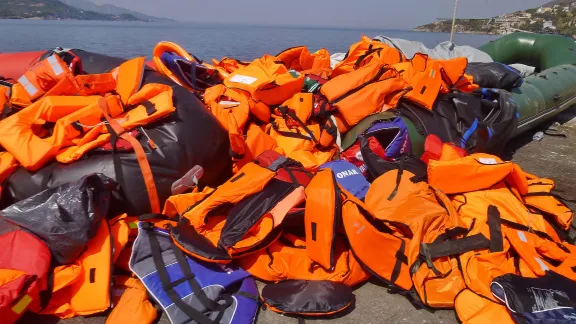
Refugees and migrants crossing the Mediterranean often do so in small boats exposing them to a high risk of running into distress at sea. Photo: IOCC/Apostoli/ACT
German churches plan to send search and rescue ship to the Mediterranean
(LWI) – It is our duty to help people whose lives are in danger, regardless of the reasons for their plight. This is the firm conviction of Heinrich Bedford-Strohm, bishop of the Evangelical Lutheran Church in Bavaria, a member church of the Lutheran World Federation (LWF). “Misery does not have a nationality,” says the bishop who is also chair of the Council of the Evangelical Church in Germany (EKD).
Joining other organizations in a broad social coalition, the EKD is planning to send a ship to save refugees crossing the Mediterranean. The fact that refugees continue to drown is unacceptable, in Bedford-Strohm’s view. “Our church and its diaconal agencies see it as imperative to save these refugees’ lives,” he says. “Christian love of the neighbor tells us not to abandon those fleeing from war and misery in their home countries and not to leave them to suffer along the way.”
Bedford-Strohm announced the founding of an association to raise funds for purchasing and equipping a ship for civilian search and rescue teams. This idea has been discussed since the German Protestant Kirchentag, a meeting of the biggest German Protestant lay movement, in June in Dortmund.
Through collecting donations to launch a ship we intend to send a clear signal of support for civilian search and rescue operations.
Kirchentag participants at the panel “Together for open ports in Europe” passed a resolution urging the EKD and its member churches to take the initiative of actively supporting civilian efforts to save those in distress at sea. “Through collecting donations to launch a ship we intend to send a clear signal of support for civilian search and rescue operations,” Bedford-Strohm repeated recently. He added that the EKD Council had expressed strong support for the idea when, on 6 September, it resolved to found an association to take the project forward. Since then, plans have been taking shape: once it has been financed and equipped, the ship is to be made available to the Sea Watch search and rescue organization.
Diaconal action is international
According to the bishop, assistance for people in mortal danger in the Mediterranean is one element in churches’ overall strategy of diaconal action. The strategy starts by addressing the root causes of forced migration, for example with the LWF program “Symbols of Hope”, which the Evangelical Lutheran Church in Bavaria supports. “In our international communion of churches, we identify people wanting to set out for Europe, and accompany them already in their own community,” Bedford-Strohm said. Symbols of Hope is meant to draw attention to “opportunities in their own country that can encourage people to stay,” Bedford-Strohm said. However, if they still attempt the voyage across the Mediterranean and run into trouble on their small boats, they should not be left to their fate. “That is why civilian vessels engage in search and rescue operations,” he added.
Preparations and advertising for support
Bedford-Strohm expressed the wish that the EKD rescue ship could be commissioned as soon as possible. He hopes it will be ready by next spring. Before that, the association formed for that purpose still needs to fundraise for about one million Euros, find a suitable vessel and sail it to the Mediterranean.
“Compassion and responsibility can’t be played off against one another,” Bedford-Strohm states, answering to criticism that German Protestant churches are guided rather by “conviction ethics”, than a sense of responsibility. He emphasized that the church is a “diaconal actor” in this situation, and not trying to influence public policy.
The LWF from its foundation right after the Second World War, has a long tradition of assisting forcibly displaced persons. Through it’s diaconal arm, World Service, it currently supports 2.7 million people through different programs and in cooperation with organizations such as the UNHCR.
The Twelfth LWF Assembly in 2017 in Namibia endorsed this commitment in a resolution on refugees, internally displaced persons and forced migration. The resolution includes an appeal to “the LWF member churches to continue advocating for welcoming refugees into their respective countries and pressure their governments, the USA and European countries in particular, not to build walls but ‘to build bridges’.”


